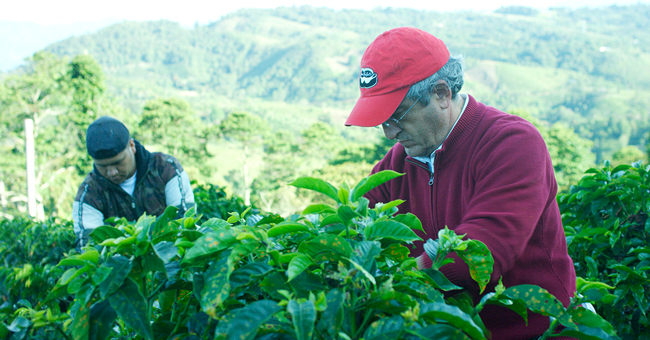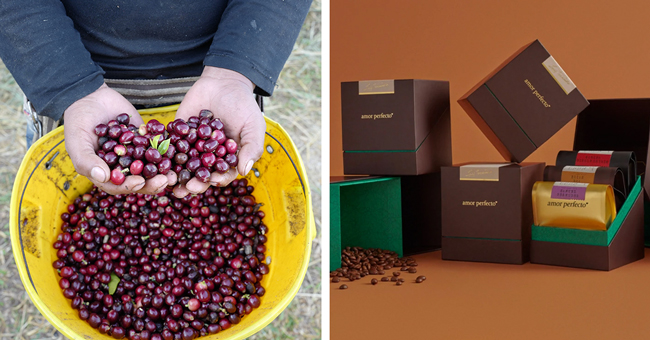For better or worse, the visage of Juan Valdez, a fictional marketing vehicle created by the National Federation of Coffee Growers of Colombia, has become inextricably linked to the worldwide perception of Colombian coffee. The humble coffee farmer, always with his trusted burro Conchita by his side, symbolizes the global appeal and heritage of the South American nation, but perhaps in a way that at best overlooks and at worst trivializes the passion and dedication behind Colombia’s coffee farmers and their unique crop.
But if Colombian coffee has a more modern face, it must be Luis Fernando Vélez. As the founder and CEO of specialty roaster and exporter Amor Perfecto, Vélez has been at the forefront of Colombia’s new-wave coffee movement since the country first allowed specialty beans to be sold domestically in 2003, a change he was instrumental in bringing forth. Over two decades on from making that breakthrough, he’s eager to see Colombia further its claim to producing the world’s best coffee.
Even as Colombian coffee became ubiquitous worldwide over the last century, the country’s internal market has looked much different. At the time Vélez was getting started in the industry in 1997, Colombian coffee roasters were forced to adhere to tight controls from the National Federation of Coffee Growers of Colombia, which, among a myriad of other regulations, restricted domestic sales exclusively to coffee deemed too low quality to be exported, as per an agreement with the state government.
But inside Vélez’s modest flower shop in Bogota, the winds of change began to pick up. The Federation allowed him to quietly begin roasting and selling small quantities of Colombian coffee, making Amor Perfecto an early test case for unleashing the potential of the local industry.
“Because of our example, (the government) changed the law and opened the market for any roaster, and also facilitated all the process to be a licensed roaster in Colombia,” Vélez said. “It completely changed the market — I would say from something like 50 roasters in 2003, there are now more like 1,200 roasters in Colombia.”
Since then, Vélez has continued to make strides in building his own reputation — becoming the first Colombian to compete in the World Barista Championships in 2001 — and in developing Amor Perfecto into a worldwide brand offering a wide variety of single-origin varietals harvested from some of the country’s most prized growing regions, all of which are available via direct-to-consumer shipping within 6-8 weeks of roasting. Within the country, Amor Perfecto is Colombia’s largest specialty coffee distributor, supplying cafes, bakeries and restaurants as well as operating their own retail shop in Bogota. The brand has also released special LTOs that highlight charitable initiatives (such as Tras La Perla) and its partnerships with female-owned farms (via its Frida Kahlo collection).
“I will say that today, you can drink a very good coffee in some places in Colombia, that was something that never happened before the year 2003,” Vélez said.
Amor Perfecto’s next goal is to plant its flag in the U.S. market, where it is aiming to reach $10 million in sales over the next five years. Its U.S. business operates as an individual business unit selling via e-commerce and to some wholesale accounts, and did around $4 million in sales in 2021.
Even as Amor Perfecto continues to help develop the Colombian coffee industry, Vélez hasn’t taken his eye off the bigger issues affecting the space: he often compares specialty coffee to wine, and not just for the craft involved in cultivation and harvesting. Rather than exporting green coffee beans, Vélez is a vocal advocate for roasting at-origin, citing an Oxford University study that showed that green coffee beans can lose key flavor elements (glucose, fructose and glutamine) during the average four-month journey that it takes to get to a roaster. Advances in packaging technology like nitrogen flushing means sending fresh roasted beans is easier and more advantageous than ever, refuting a long-held belief amongst coffee producers, while roasted beans also carry less weight in retained water.
“Have you ever seen a container of grapes leaving France to make Champagne in New York? Of course not,” he said. “So why does that happen in coffee? Since 200 years ago, we have believed that roasting coffee at origin is not possible and not good. But since countries like Colombia have started to learn about how to roast coffee, and have created a large number of entrepreneurs working in coffee, we have found that roasting at origin makes sense and produces a better cup of coffee. The only thing we need is to change that misconception from around the world and make people believe that if they buy a Colombia coffee roasted at origin, it makes the whole industry more sustainable and more specialized.”
As he approaches nearly a quarter-century in the coffee game, Vélez’s impact on Colombia’s coffee culture continues to be felt: last December in Milan, Diego Campos — “a kid who has been working with us since he was 18,” he noted — became the first-ever Colombian to win the World Barista Championships.
“All that research, all that training, all that technology that we have brought to Colombia allows us today to say if we are able to win the world championship, it’s because we are roasting in a very high quality way and we are producing a very high quality coffee,” he said. “We believe that the one that creates the cup profile is not the roaster — it’s the grower. The task of the roaster is to find the best way of roasting the coffee to discover all the flavors that the grower already produced at the farm level.”

